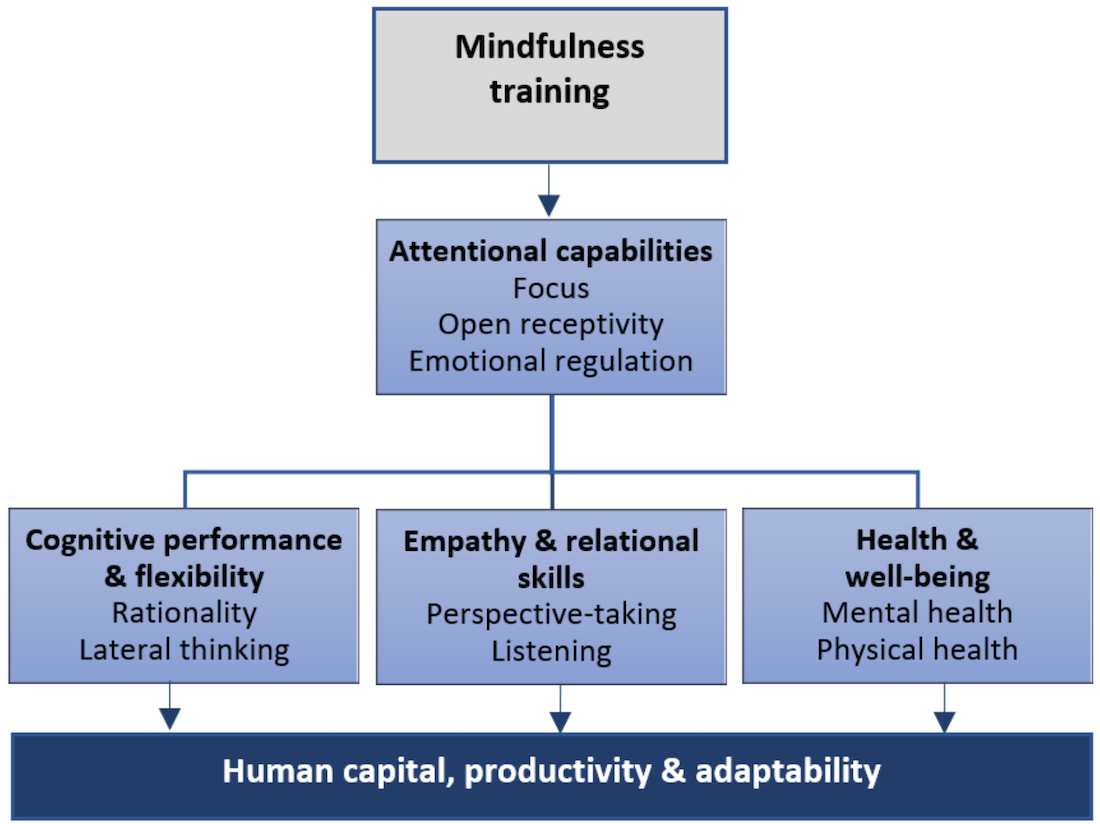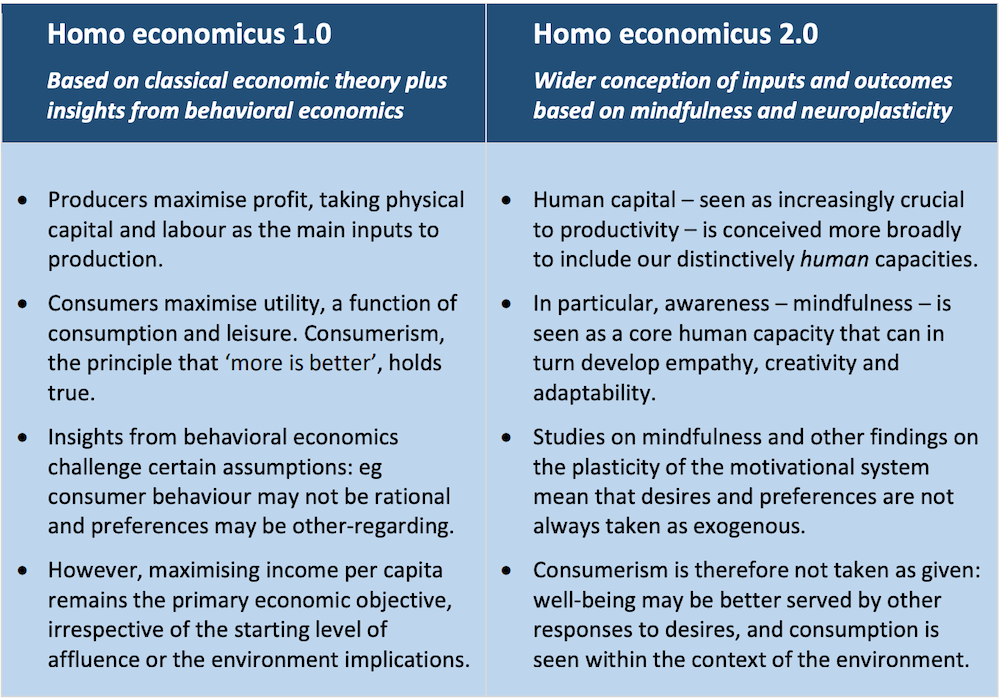In response to Jeffrey Sachs’ call for ‘an improved and updated economic anthropology’, we conclude this series of articles by focussing on capacities based on human awareness – and thereby pointing to a more human-centered (and, perhaps, less ‘algorithmic’) picture of the human being to sit at the center of our economic models and narratives.48
This is summarized in Table 1. For simplicity, it treats the baseline homo economicus 1.0 as an amalgamation of previous phases of economic thinking, including the substantial body of insights gained from behavioral economics. The reformulated picture – homo economicus 2.0 – involves widening how we think about economic inputs (like human capital) and outcomes (like well-being) to account not only for our material needs, but our capacity for awareness, our ability to adapt and our wider environmental context. Moreover, by placing more weight on the role of social capacities, like empathy, it also speaks to Tania Singer and Dennis Snower’s call for a move towards what they call ‘caring economics’. 49
This vision of a more human-centered economy perhaps addresses criticisms that economics is excessively reductionist in approach. Mark Carney, for instance, has spoken about our human tendency to compartmentalize things: how we divide up our lives into different realms, ‘each with its own set of rules’: where home is distinct from work, where ethics is distinct from law, where the individual is distinct from the system. Such a ‘reductionist’ view of the human condition, he says, serves as a poor foundation for long-term prosperity.50
Perhaps mindfulness could help us rebuild that foundation, due to the fact that it can help individuals to integrate different spheres of their lives: mind and body, head and heart, work and home, self and society, and so on?51
What Would a More Mindful Economy Look Like?
Based on the analysis so far, what would be the overall impact of large-scale investment in mindfulness training across schools, work and adult populations? At the macroeconomic level, the key upshot would be to yield both higher aggregate productivity growth and lower long-run GDP growth (and reducing the hours worked to reduce the growing cases of professional burnout), the latter driven by a reduction in long-run consumption growth. The adjustments to the new steady-state would be incremental: cohorts are assumed to gradually – but permanently – increase their mindfulness capacities, and associated capacities of heart and mind, over the course of a number of years. The economy would adjust gradually to this change in consumer behavior and the amount and type of human capital.
The combination of these two outcomes makes an increase in the aggregate level of mindfulness across the population a very unusual as a type of economic shock, yet an extremely promising one from the joint perspective of human and environmental interests. Some of the macroeconomic implications are discussed a little further below. Meanwhile, Annex II outlines some ways in which mindfulness training could support the evolution of finance, based on the work of the The Mindful Finance Institute.
There are, of course, many more angles and complexities that could be considered. The intention here is not to present mindfulness as the whole answer, but to invite further discussion on the potential for human capacities of heart and mind – such as awareness, empathy, creativity, adaptability and seeing ourselves within an environmental context – to inform a long-run vision for the economy.
Q1: Assuming that more mindful consumers would be less impulsive in certain markets, why would one predict aggregate consumption (and GDP) growth to be lower?
A1: It is true that, in theory, more mindful consumers could shift away from certain impulse buys – such as ‘fast fashion’ – towards more considered consumption behavior, leaving net expenditure unchanged. Based on some of the findings, such as the Brown et al (2009) study on financial desire discrepancies and one’s overall sense of ‘enough’, we are assuming that on aggregate, a significant uplift13 in the level of mindfulness could lead to lower long-run consumption growth. Effectively, then, we are assuming that more ‘mindful’ individuals place relatively greater weight on ‘non-market’ and intrinsic determinants of well-being.52
Q2: If economic growth would be lower, all else equal, how can this be a good thing?
A2: The key point is that this would result from individuals’ revealed preference for a less consumption-intensive lifestyle. It is important to make the contrast between this and an involuntary fall in consumer spending caused by a negative supply shock. Moreover, in the mindful economy scenario, the corollary to lower GDP growth would likely be a gradual (and voluntary) reduction in hours worked per person – accompanied by a reduction in professional burnout. By contrast, following a negative supply shock, you might instead expect to see a spike in unemployment. Finally, the outlook for the stock of natural capital would be much improved. This could significantly reduce risks to both the natural environment and human livelihood.
Q3: How do you reconcile higher productivity with lower long-run GDP growth?
A3: For economies with a trade deficit, like the U.S. and the UK, over the near-to-medium term it may be desirable to produce more than is consumed at home. That is, by boosting productivity at the same time as restraining consumption, mindfulness could serve as a ‘mental technology’ that could support a rebalancing of the trade account.53
In the long-run, and to the extent that this became a global trend, higher productivity and lower demand would be reconciled by a fall in average hours worked. In this respect, the proposal outlined here chimes with the calls from other thinkers that, when productivity rises, we should make ‘a more active choice’ about how the gains are realized.54 Mindfulness could be one factor enabling such an active choice. A reduction in hours worked has been predicted, incorrectly, before.55 What is distinctive about mindfulness as a basis for change, however, is that it operates at the fundamental level of how individuals come to engage with their own desires and preferences.
Q4: How could we transition towards a more ‘mindful’ economy in practice?
A4: Annex I sketches out, very briefly, how a large-scale program of government investment could widen access to mindfulness training courses across child and adult populations in the UK, leading to an increase in the aggregate level of mindfulness. Underpinning this approach is the idea that we should treat access to mindfulness training as a kind of basic public amenity, not so different from a playground or a job center. We also propose the creation of a civil service unit, the ‘Mindfulness and Human Capabilities’ Unit, drawn across government departments, to oversee such an initiative. That unit would also be tasked with monitoring indicators of economic outcomes in order to assess the success and future direction of the scheme.14
In his book, 21 lessons for the 21st Century, the historian Yuval Noah Harari argues that ‘for every dollar and every minute we invest in improving artificial intelligence, it would be wise to invest a dollar and a minute advancing human consciousness’.56 The contention we have explored in this 5 part article series is that investing in our ‘human consciousness – that is, our capacity for awareness, or mindfulness – could form an integral part of a vision for a flourishing, adaptable and sustainable ‘21st Century’ economy. Arguably, mindfulness could be viewed as a foundational human capacity, in light of the various domains of human functioning that it has been associated with.57
In particular, based on our reading of the evidence, we suggest that an uplift in the aggregate level of mindfulness could benefit the long-run course of the economy through an unusual combination of factors. On the one hand, it could boost the stock of human capital, supporting a more productive and adaptable economy. At the same time, we might expect to see a reduction in average hours worked (again, accompanied with fewer cases of professional burnout), and more modest consumption and GDP growth, with benefits both for human and planetary well-being.
This article series represents a first attempt at thinking through some of the channels through which mindfulness training could impact economic variables. There are many other angles (for instance, to do with income equality, the nature of work, ethical consumption, and so on) which we have not considered here. We hope this series of articles will stimulate discussion around the broad question of whether a more ‘human centered’ approach to economics is needed for the world’s long-run prosperity, as well as the specific question of whether mindfulness could play a helpful role in supporting a transition to a more adaptable and sustainable economic model.15
About the Author: This excerpt was edited and reprinted with the permission of our friends at The Mindfulness Initiative. To learn more about their work, please visit www.themindfulnessinitiative.org to find out more.
Find the original work here.
View References
14 This is the ability to appropriately direct attention amid competing demands.
15 See Cahn & Polich (2009) and Allen et al (2012).
48 See: https://www.youtube.com/watch?v=ajrJbnXTwL8&feature=youtu.be
49 See https://www.ineteconomics.org/research/research-papers/caring-economics.
50 See Carney (2014).
51 Brown et al (2007) discuss the idea that cultivating mindfulness can support “integrated functioning”. For a discussion of the link between mindfulness and awareness of one’s social context, see https://www.garrisoninstitute.org/blog/is-mindfulness-inherently-contextualizing/.
52 See for instance Kasser & Ryan (2001). Brown (2017), meanwhile, argues that as an economy becomes developed, the quality of life becomes more dependent on nonmarket activities and on enriching people’s lives beyond consumption.
53 When it comes to exporting psychological technologies (like mindfulness training programmes) themselves, global leaders like the Oxford Mindfulness Centre (part of Oxford University) are already delivering programmes in Africa, China, the Middle East and across Europe. In time, psychological technology research, development and delivery could meaningfully contribute to the exports of Britain’s service industry.
54 See https://www.ippr.org/files/2018-08/1535639099_prosperity-and-justice-ippr-2018.pdf
55 See Keynes (1930).
56 See Harari (2018).
57 The evidence on the effectiveness of mindfulness across so many domains has led some scientists to label it











